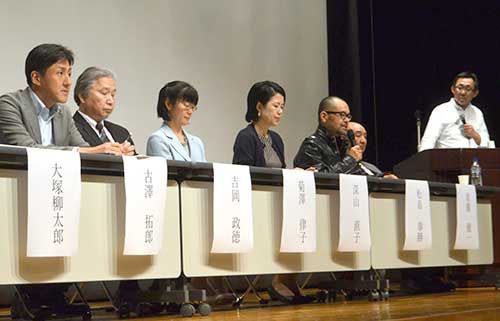Public symposium held to discuss Ryukyuan remains kept by Kyoto University

On March 21 at Okinawa Prefectural Museum in Naha City, researchers of the Japanese Society for Oceanic Studies presented their opinions at the open symposium
March 22, 2018 Ryukyu Shimpo
On March 22 at the Okinawa Prefectural Museum in Naha City, the Japanese Society for Oceanic Studies held a public symposium.
Professor Yasukatsu Matsushima of Ryukoku University reported that many human remains were removed from Okinawa by anthropologists from this former imperial university in the early Showa era, and were not returned.
Matsushima made a request for the remains to be returned, and made known once more that he plans to bring a class action lawsuit against Kyoto University, which keeps the remains.
Matsushima said, “Grave robbery is a criminal offense under criminal law, and storing stolen goods is complicity.”
He criticized that, “It is an injustice that the remains of the ancestors who built the foundation of the Ryukyu Kingdom were not buried or given service for the repose of souls in the manner of the Ryukyuan people.”
Moreover, he requested their return and emphasized that, “By receiving proper burial, the remains revert from being objects to being the souls of people. Their relationship with the living world will be restored. This would be a political symbol for decolonization.”
Associate Professor Naoko Fukayama at Tokyo Metropolitan University, who is researching the indigenous Maori of New Zealand, said, “Okinawa and Oceania have commonalties, in that they were subjected to colonialism. Oceanic studies can contribute to Okinawa in many ways thorough observing how residents talk about their culture and keep it alive.”
Masanori Yoshioka, a visiting professor at the Open University of Japan’s Hyogo Study Center, pointed out that the problem is that Oceania is still seen as a “frontier.” He suggested that, “By focusing on elites such as Hilda Lini, a leader of cultural revival in Vanuatu, we will be able to understand [Oceania] as the fusion of tradition and modernity.”
(English translation by T&CT and Megumi Chibana)
Previous Article:Ginoza trainees report back on their cultural exchange findings
Next Article:Protesters demand a reversal of peace-leader Hiroji Yamashiro’s sentence at demonstration in front of the Japanese Embassy in Washington D.D.
[Similar Articles]
- National Taiwan University announces intention to return 63 Ryukyuan remains excavated from Nakajin
- Research Association published an open letter to Kyoto University
- Kyoto District Court dismisses lawsuit calling for return of remains to Okinawa
- The Nirai Kanainu-kai organization is formed to demand the return of over 219 Okinawan remains taken from Okinawa
- Researchers to establish a new association to request return of Ryukyuan remains
 Webcam(Kokusai Street)
Webcam(Kokusai Street)


